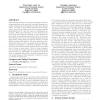Free Online Productivity Tools
i2Speak
i2Symbol
i2OCR
iTex2Img
iWeb2Print
iWeb2Shot
i2Type
iPdf2Split
iPdf2Merge
i2Bopomofo
i2Arabic
i2Style
i2Image
i2PDF
iLatex2Rtf
Sci2ools
124
Voted
KDD
2008
ACM
2008
ACM
Training structural svms with kernels using sampled cuts
Discriminative training for structured outputs has found increasing applications in areas such as natural language processing, bioinformatics, information retrieval, and computer vision. Focusing on large-margin methods, the most general (in terms of loss function and model structure) training algorithms known to date are based on cutting-plane approaches. While these algorithms are very efficient for linear models, their training complexity becomes quadratic in the number of examples when kernels are used. To overcome this bottleneck, we propose new training algorithms that use approximate cutting planes and random sampling to enable efficient training with kernels. We prove that these algorithms have improved time complexity while providing approximation guarantees. In empirical evaluations, our algorithms produced solutions with training and test error rates close to those of exact solvers. Even on binary classification problems where highly optimized conventional training methods ...
Algorithms Produced Solutions | Conventional Training Methods | Data Mining | General Terms Algorithms | KDD 2008 |
Related Content
| Added | 30 Nov 2009 |
| Updated | 30 Nov 2009 |
| Type | Conference |
| Year | 2008 |
| Where | KDD |
| Authors | Chun-Nam John Yu, Thorsten Joachims |
Comments (0)

